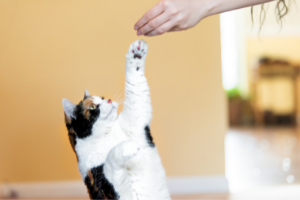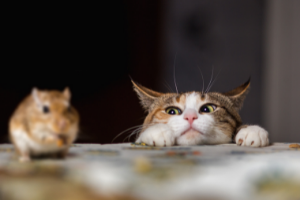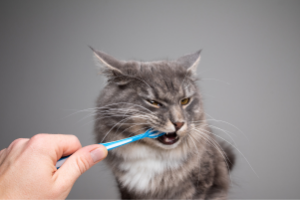Cats are curious creatures. It should come as no surprise, then, that there are loads of myths surrounding their health and behavior. That does not mean, though, that you should believe everything you hear – especially when it comes to caring for your beloved pet.
As veterinarians, we have heard all the myths and misconceptions surrounding cats. Sadly, we have also seen plenty of patients who needed veterinary care because their owners mistakenly believed the wrong information. This article will be separating the facts from the fiction to help you give your feline friend the best life possible. Read on to learn more from these eight common cat myths.
1. Cats Should Have One Litter of Kittens Before Being Spayed
Many folks believe that a female cat should give birth before being spayed, but this is not true. Allowing your cat to have a litter of kittens offers no benefit. In fact, waiting for your cat to reach sexual maturity before spaying them could be detrimental to their health. Cats who are not spayed before their first heat cycle are more susceptible to mammary cancer and uterine infections. Don’t wait. Have your cat spayed as early as possible.

2. Cats Always Land on Their Feet
This is one of the most common myths about cats, and it’s dangerous. Cats are graceful, but just like any other creature, they can suffer severe injuries from falls. Falls from low heights can also be hazardous as there is not enough time for the cat to right itself before landing. Keep in mind that a safe landing isn’t guaranteed even when a cat lands on its feet. Jumps and falls from great heights can cause sprains, fractures, and other serious injuries. Your cat may be graceful, but that does not mean they are immune to injuries from falls or jumps from high surfaces.
3. Milk Is an Acceptable Treat for Cats
Many cats enjoy milk. Unfortunately, it is not a suitable treat for your feline friend. It is not a natural part of a cat's diet, and many felines are lactose-intolerant. Even lapping up a small amount can lead to digestive upset, vomiting, or diarrhea. Plus, cats who drink milk frequently are more likely to be obese. For your furry friend’s health, avoid giving them milk (no matter how much they beg).

4. Cats Cannot Be Trained
A cat may not be the first animal that comes to mind when you think about pets doing tricks. That does not mean that they cannot be trained, though! With patience, you can teach your cat basic obedience and commands as well as tricks. The key is positive reinforcement. Training a cat can be challenging, but it is possible with the right rewards and plenty of determination.
5. Indoor Cats Do Not Need Vaccinations
If you don’t think your indoor cat needs to be vaccinated, think again. Even if your feline friend never puts a single, delicate toe bean outside, they can still contract various diseases. Germs can enter your home on your clothing or another pet. Plus, insects, parasites, bats, and rodents that make their way into your home can transmit all sorts of nasty things to your indoor cat. And, it is always possible for your indoor-only cat to sneak outside by accident. Please keep your pets safe by having them vaccinated. Talk to your vet to determine which vaccines are suitable for your indoor cat.

6. Cats Have Nine Lives
The myth that cats have nine lives dates back hundreds of years. Unfortunately, it has made far too many folks believe that cats can survive nearly anything and do not need routine veterinary care. Just like any other living creature, cats only get one life. As a pet parent, it is your responsibility to make sure your feline friend’s life is a long, healthy, and happy one.
Schedule annual wellness exams, and be sure to keep your cat up to date on vaccinations and parasite preventatives. Doing so will not give your cat more lives, but it will add years to the one life they get.
7. A Purring Cat Is a Happy Cat
Indeed, cats often purr when they are feeling happy and content. Unfortunately, those are not the only times your cat might purr. Purring is a self-soothing mechanism, and it is something that cats commonly do to comfort themselves. As a result, cats also do it when they are sick, frightened, or in pain. If your cat seems hurt or unwell, do not assume that hearing them purr means they are okay. Schedule an appointment with your vet if you have any reason to suspect something may be wrong.

8. Cats Do Not Need Dental Care
The thought of brushing your cat's teeth may seem silly, but cats do need dental care. At-home brushings combined with professional dental exams and cleanings reduce the risk of periodontal disease. Dental care is an integral part of wellness care and protects pets from pain, infections, and even organ damage. If you have not been properly caring for your cat’s teeth, schedule an appointment for a professional cleaning. A vet can also teach you how to better care for your cat’s pearly whites at home too.
In Closing
We love cats for their curious and mysterious tendencies. Unfortunately, these things have also led to numerous myths and misconceptions. Before believing everything you hear or read, take the time to do some research. And when in doubt, consult with a veterinarian. Forming a relationship with a vet is the best way to ensure that your feline friend will receive appropriate care based on science – not superstition. If it has been a while since your cat’s last checkup, give your vet a call to schedule an appointment. Don't have one yet? We can help you find a local veterinarian!
